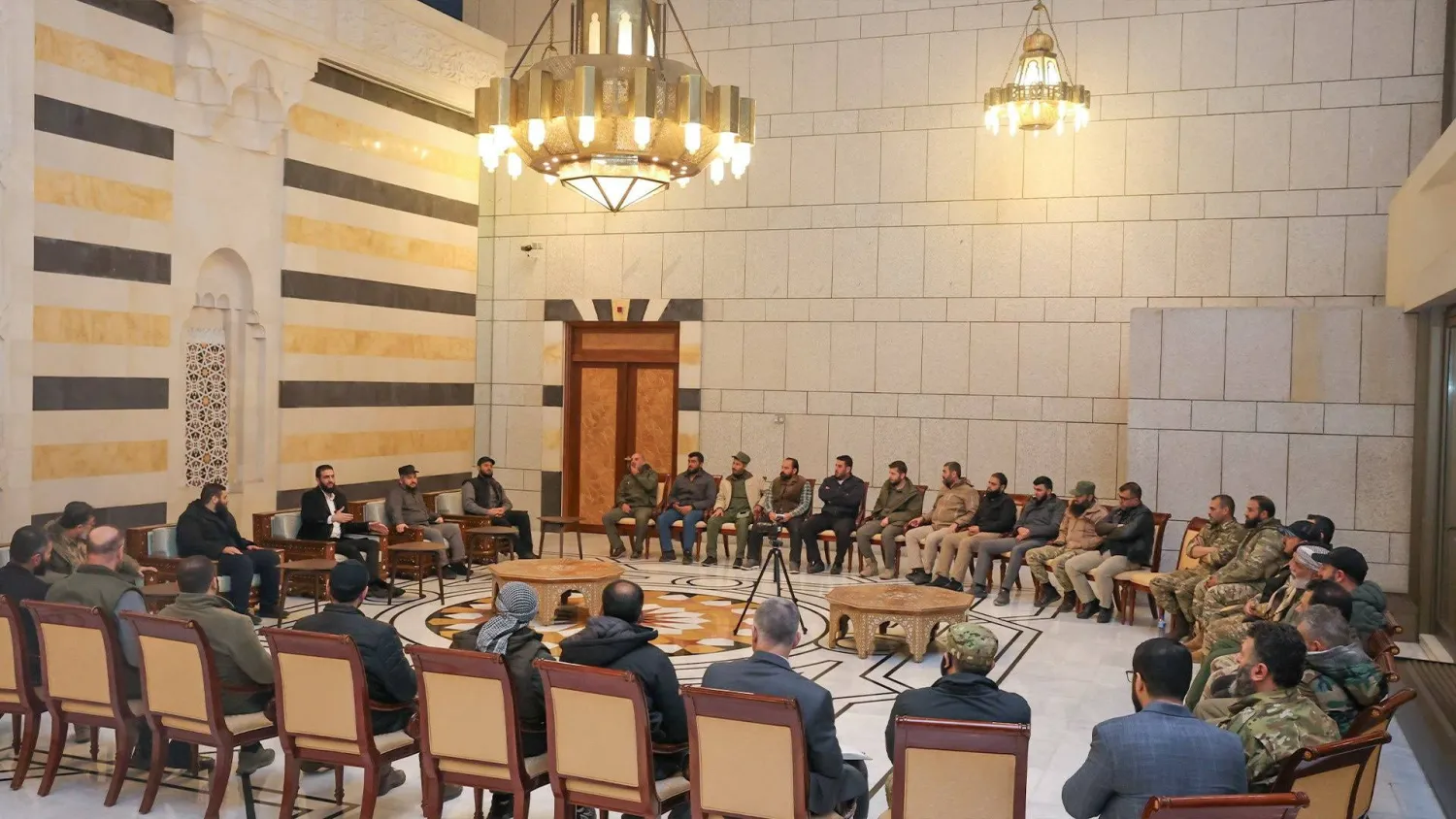
403
Sorry!!
Error! We're sorry, but the page you were looking for doesn't exist.
Syria's Al-Sharaa Strikes Deal With Militant Factions To Merge Under Defence Ministry
(MENAFN- Daily News Egypt)
Syria's new de facto leader, Ahmed Al-Sharaa, has reached an agreement with commanders of militant factions to dissolve their groups and integrate them into the Ministry of Defence, marking a critical step in the country's transition after more than a decade of civil war.
The announcement, made on Tuesday by the General Command of the new Syrian administration, follows weeks of negotiations aimed at consolidating armed groups under a single, state-controlled military framework. The agreement, if fully implemented, could redefine Syria's fractured military landscape, which has been shaped by years of conflict involving rebel groups, Islamist factions, and regional powers.
“This agreement represents a pivotal moment in ending the division of armed factions and establishing the foundations of a unified military institution for the new Syria,” the General Command said in a statement shared on Telegram.
Ahmed Al-Sharaa Takes Steps Toward a Unified Military
Al-Sharaa, speaking at a press conference in Damascus on Sunday alongside Turkish Foreign Minister Hakan Fidan, said the state would no longer tolerate independent armed groups, signaling a strict approach to consolidating power.
“We will not allow the existence of weapons outside state control-whether they belong to militant factions or to groups operating in areas under the control of the Syrian Democratic Forces (SDF),” Al-Sharaa said, referring to the Kurdish-led coalition that governs northeastern Syria.
The deal involves more than 15 armed factions, including Jaysh Al-Islam, Ahrar Al-Sharqiya, Al-Jabha Al-Shamiya, and Tajammu' Al-Shahbaa. Photographs published by state news agency SANA showed Al-Sharaa meeting with faction leaders in Damascus. However, the SDF was absent from these discussions, underscoring ongoing tensions with the Kurdish-led group, which has long maintained autonomy in parts of Syria.
SDF Seeks Dialogue
Farhad Shami, spokesperson for the SDF, said the group was open to dialogue with Damascus but called for direct negotiations without the interference of external powers.
“This issue requires direct discussions between the SDF leadership and Damascus, free from the influence of regional actors,” Shami told AFP.
He added that the SDF could form the core of a restructured Syrian army, saying,“A unified army built on the foundation of the SDF would be a strength for all of Syria.” However, Shami emphasized the need for broader political reforms, including drafting a new constitution, holding inclusive elections, and guaranteeing the rights of all Syrian communities.
Defence Ministry Overhaul
Syria's new Prime Minister Mohammed Al-Bashir said last week that the Ministry of Defence would be restructured to incorporate former militant factions and army defectors who left their posts during Bashar Al-Assad's rule.
“The Ministry of Defence will serve as the umbrella for all military components in the new Syria, bringing together various factions and creating a cohesive national army,” Al-Bashir said.
The integration of militant groups, many of which have competed for dominance throughout the war, presents a significant challenge. Analysts say Al-Sharaa must carefully navigate the rivalries between factions while preventing potential flare-ups of violence as they are brought under a unified command.
A Transitional Government Takes Shape
The agreement comes as Al-Sharaa continues to assemble his transitional government following the fall of Assad's regime earlier this month.
Among the key appointments announced so far:
.Asaad Hassan Al-Sheibani , a co-founder of Hay'at Tahrir Al-Sham, was named foreign minister, reflecting the inclusion of figures from former Islamist factions.
.Aisha Al-Dibs, the first woman in the cabinet, will lead a newly created office focused on women's affairs.
.Marhaf Abu Qasra, known as Abu Hassan Al-Hamwi, was appointed defence minister.
.Azam Gharib, also known as Abu Al-Ezz Saraqib, a leader of Al-Jabha Al-Shamiya, was named governor of Aleppo.
These appointments highlight the new administration's attempts to balance representation among former opposition figures and Islamist factions, while addressing demands for inclusivity.
International Engagement and US Policy Shift
The new administration's efforts to consolidate power have drawn the attention of international actors. On Monday, the United States announced it had scraped a $10 million bounty on Al-Sharaa, which had been issued during the conflict over allegations of terrorism.
The US decision signals a potential shift in policy toward Syria's new leadership, although Washington has not formally recognized Al-Sharaa's administration.
Al-Sharaa's government has also received overtures from regional powers, including Turkey, which has backed some of the militant factions now participating in the integration process.
End of Assad's Rule
The agreement with militant factions comes just weeks after opposition forces captured Damascus on Dec. 8, forcing Assad to flee after more than 13 years of civil war. The fall of the capital marked the end of the Assad family's decades-long grip on Syria.
While Al-Sharaa's administration has taken steps to establish control, it faces monumental challenges, including rebuilding state institutions, addressing humanitarian needs, and forging a political framework acceptable to Syria's diverse communities.
“The road ahead will be difficult, but this agreement is an important step toward stabilizing the country,” a senior official in Al-Sharaa's government said on condition of anonymity.

Legal Disclaimer:
MENAFN provides the
information “as is” without warranty of any kind. We do not accept
any responsibility or liability for the accuracy, content, images,
videos, licenses, completeness, legality, or reliability of the information
contained in this article. If you have any complaints or copyright
issues related to this article, kindly contact the provider above.


















Comments
No comment